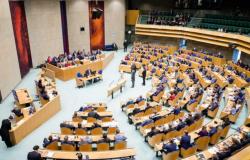
Caroline Tervoort has been CHRO of KPMG Netherlands since 2019. Although she started her career at the accountancy and consultancy firm years earlier. She had already gained extensive experience at KPMG in various HR positions, ‘on both sides of the table, both as a strategic HR consultant and in the role of HR leader’. In November she was elected CHRO of the Year.
‘It is important that we put people in leadership positions who also have a talent for that’
“She is a role model as a CHRO,” said the jury. During the upcoming Leadership in HR Summit on April 17, the CHRO will give a keynote lecture on the question of how to best emerge as a leader and come to the fore with the impact that you have in mind.
Candidates for the CHRO Award must distinguish themselves on their innovative capacity, ability to inspire and having an impact. Which of those three themes weighs most heavily on you?
“Impact. People are becoming increasingly important in the organization and in the strategy. As a CHRO you must therefore understand what your organization is doing, what developments are taking place and what business models are changing. You have to connect to that and translate it into something that you can make an impact with your people agenda. I also look for authenticity at a CHRO: don’t act rehearsed, come as you are.”
What currently defines the role of the HR leader?
“Many developments influence an organization and how you implement your people strategy – for example the MeToo movement, tensions in society and the increased cost of living. As HR, you have to do something about this when it comes to psychological and social safety in the workplace. You can make an impact as a CHRO by listening carefully and understanding what is happening in the environment, and translating that into what the organization needs to remain successful.”
‘The themes are not necessarily new, but how they present themselves is’
Do you feel like what’s going on now is different from ten years ago?
“Yes, the financial crisis of ten years ago was something completely different from, for example, the corona crisis. And the MeToo movement unleashes something that may have always been there, but which is now receiving much more attention, also in organizations. So the themes are not necessarily new, but how they present themselves is. And therefore also what type of CHRO is appropriate to make that impact.”
Do you notice the growing need for meaning, for example among Generation Z?
“That certainly plays a role. We are a young organization, the average age is 34. And that generation has a different approach to life than the current leaders. You have to remain meaningful for the new generations, otherwise they will not come or they will leave. It is now much more about empathy, you have to ask: what do you need and how are we going to do that together in a good way. That is a completely different way of leading than ten or fifteen years ago.”
How do you approach that?
“By listening carefully. Don’t think you can fill it in for them. So we continue to talk closely with them. We have a Young Board Now, where the young generation challenges us as a board on important strategic themes. The Young Board Now consists of young people under the age of 30 who keep us on our toes and provide input on strategic topics and matters that are important to them, such as sustainability. In this way we try to make an impact together and do things that are relevant to this generation.”
As a CHRO you act as the moral compass of the organization. How do you fill that role?
“As HR you must be and remain as independent as possible, because only then can you play your role well. If you see things that are not going well, you should always say so. We’ll see if we do something with it. But then at least we have the choice whether or not to do something with it. That, I think, is the moral compass. And I think it is becoming increasingly important for HR, as the conscience of the organization.”
‘As HR you must be and remain as independent as possible’
Do you have an example of that?
“Take generative AI. Fantastic, you can use it to tie everything together and gain insights. But as a manager you also have to ask yourself: It may be possible, but is it right? These things are becoming increasingly important as organizations increasingly work with these types of instruments.”
That is a nice bridge to the interpretation of leadership. An important aspect is the behavior of leaders in public. Are they sufficiently aware of this?
“That varies. New leadership is based on empathy, compassion and curiosity, and no longer on a transactional relationship – I give you a nice salary and good development and then you do what I ask you. It is important that we put people in leadership positions who have a talent for empathetic leadership.
You still see in organizations that we give a leading role to someone who still has to learn. Then you run a great risk of losing people who do not feel inspired or challenged. I believe that you should let someone lead who is already very good at it and can excel at it. Please use people’s talents, because that creates trust.”
‘You have to let someone lead who can already do it very well’
How do you ensure that you as a leader are consistently visible and use that to have the right impact?
“That’s dosage, I think. Because as a leader you have to be there and visible at certain times. Especially at times when there is a crisis, or when something happens in someone’s life. Sometimes you also have to dare to stand in front of a group and deliver unpleasant messages. But you also have to know when to take a step back and stand in the wings to give others the stage. The art of a good leader is to have that flexibility, to have that control, to make adjustments accordingly.”
You say you have to dose. But how do you ensure maximum impact when you are in the spotlight?
“I draw on my own experiences to make it real, with a personal component. For example, if something bad has happened to me, I can also use that to explain to someone else what I mean, what feeling that gives and how important that is. This is how you can make an impact. Make it personal, for me that is the only way I can convey a message with power.”
An important social topic is psychological safety and the harmful effects of transgressive behavior within organizations. How should you deal with this if the top of the organization is involved?
“At KPMG we have a group of confidential counselors who you can always go to if there is something you think: I find this very complicated. These are independent people, the top of the organization has no influence on this. We also have a complaints and disputes committee, which applies adversarial hearing and carefully supervises this.
‘As a leader you have to know when to stand up – and when to step back’
“And then you have a whistle-blowing hotline. In other words, if you think: I want to remain anonymous, something is really going on and I want to report it, you can do so via that hotline. That is a kind of last resort, because far too much has already happened. In this way, we ensure that even if someone at the top of the organization is involved, there is a protocol with which people can express their dissatisfaction or report abuses.”
Well, then it’s been reported, but what? Then the person in question must be spoken to about it. Who does that, if it concerns someone from the top of the organization?
“Then the supervisory board is deployed. But you do have your safety net: you use it to ensure that people feel that they have been heard properly and that they can also tell their story objectively. Because if something bothers someone, that is one side of the story. So you always have to make sure you take the other side of the story, because you have to do both justice.”
What are common mistakes when it comes to ensuring a safe working environment?
“Every situation is different. But often it’s smaller things that make people think: then I won’t say anything anymore. This has to do with microaggressions, misplaced jokes, for example. Pinpricks that, if given too often, get stuck under your skin. Then something only has to happen for you to have an issue. So it’s important to start the conversation about that and say: I don’t like that joke. We invest in this, so that people dare to say it. Because it takes courage to say to someone: ‘that may have sounded nice to others, but it comes across wrong to me’. When you can say that, the sharp edges are often gone. That is what we mainly focus on: the lowest possible threshold for simply saying the smallest things.”
‘You want to encourage the conversation to start before the threshold becomes too high’
How do you ensure that psychological safety can be discussed?
“We do this on the basis of our satisfaction survey. There we specifically ask whether people have seen or experienced undesirable behavior. This enables us to enter into discussions and raise specific issues. So there’s a lot of dialogue. Because things often go wrong when you don’t communicate. You don’t want people to make assumptions: I must not be seeing it correctly. You want to encourage people to ask a question and start the conversation before the threshold becomes too high.”
So it’s about practicing how to express yourself in a certain situation?
“Yes, for example, we have created a booklet with examples to keep the threshold as low as possible. How do you start a conversation about social safety? They are practical conversation starters; that help.”
‘I really believe that if you have the feeling that you can say everything, you will perform much better’
Psychological and social safety are a prerequisite for inclusion?
“That is indeed the core. I really believe that if you have the feeling that you can be completely yourself and say everything, you will perform much better. Your brain then has 100 percent space to focus on work. Everyone benefits from this safety: first of all the person themselves, but then also the team and our customers. So it is my firm belief that we should pay a lot of attention to this and invest a lot in it.”
Caroline Tervoort has been CHRO of KPMG Netherlands since August 2019. Previously, she was HR Director at Danone Nutricia Benelux (2016 – 2019), after being International HR Director at Stage Entertainment (2015 – 2016).
Tervoort was also previously employed by KPMG. From 2003 to 2014 she worked in various managerial HR positions before switching to the Advisory practice, where as a strategic consultant she founded the People & Change Advisory practice, which she also led from 2013 to 2015. . Tervoort studied General Social Sciences in Utrecht.
Tags: Podcast episode Caroline Tervoort CHRO KPMG Netherlands impact role leader
-




